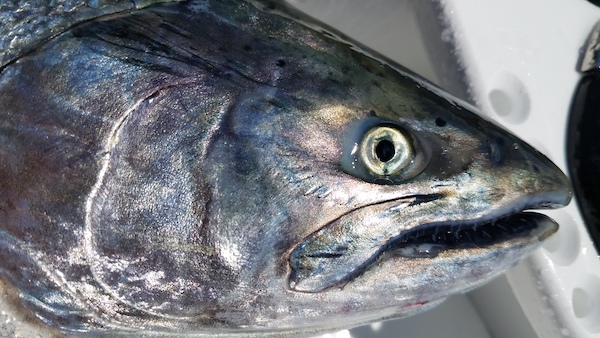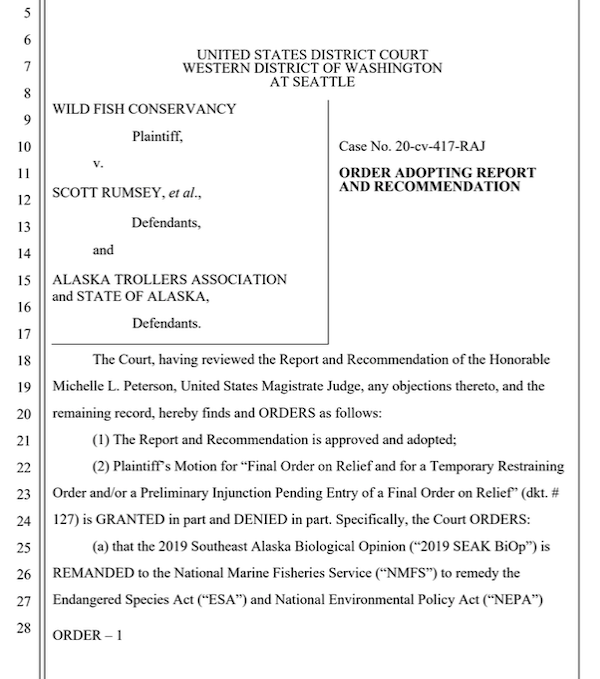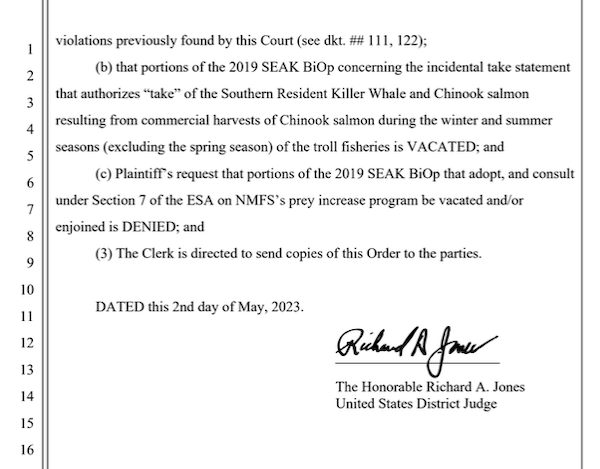
SE AK Chinook Troll Fishery Ruling Preserves Orca Prey Initiative
A federal judge in Seattle has adopted a recommendation to deny a bid to derail Northwest hatchery Chinook production increases meant for southern resident killer whales while apparently closing the lucrative Southeast Alaska commercial troll fishery for the salmon.

The order from US District Court Judge Richard A. Jones yesterday remands the authorizing biological opinion for the troll fishery back to the National Marine Fisheries Service to remedy Endangered Species Act and National Environmental Policy Act violations and vacates the winter and summer “takes,” or harvests, of Chinook in Alaska’s Panhandle.
It’s a mixed bag for Wild Fish Conservancy which had been attempting to scuttle the biop, commercial fishery and prey increase program with this lawsuit, but is not its only effort on that third front. In another federal case reported on here earlier this week, the Duvall-based organization is trying to negate WDFW efforts to boost orca forage by 20 million-plus Chinook, which as they return to natal streams are expected to have “shirttail” benefits for fishermen of all stripes.
Judge Jones’ Tuesday ruling was met with anger by Alaskan interests, including Governor Dunleavy’s administration which vowed to immediately appeal the “radical step” to the Ninth Circuit Court of Appeals. The Alaska Beacon reported that it’s a “decision that threatens hundreds of jobs and a $30 million industry … in which some 900 permit holders harvest roughly 200,000 salmon each year.”
“As a wild salmon-focused environmental organization, SalmonState condemns the Wild Fish Conservancy’s misguided, irresponsible litigation – which in all probability won’t save a single endangered killer whale, but will ruin the livelihoods of thousands of Southeast Alaska’s most committed, long-term conservationists and wild salmon allies,” said SalmonState executive director Tim Bristol in a press release carried last night by Northwest Sportsman sister magazine Alaska Sporting Journal. “This is an abuse of the Endangered Species Act by out of touch, ideological, serial litigants.”
Conversely, fellow defendants in the case were less effusive.
“At this point all we can say is that we are reviewing the ruling,” said NMFS spokesman Michael Milstein in Portland this morning.

Last December, after hearing arguments on the case which was filed way back in March 2020, Magistrate Judge Michelle L. Peterson in Seattle issued a 40-page recommended ruling on the 2019 NMFS biop that authorizes the troll fishery and which leaned on increased hatchery production in Washington that is expected to deliver a 4 to 5 percent boost to Chinook numbers at sea, benefiting orcas, to help support the commercial harvest.
While Peterson took issue with how NMFS implemented the prey program and WFC wanted it enjoined, or no money spent on it, until the biop was remedied, it since has been fully funded for federal and state hatcheries and more than 19 million Chinook smolts have been released.
“A disruption to the prey increase program, or its funding, thus appears primed to result in gaps in prey abundance that would lead to increased risk to the health of the SRKW and threaten any future operation of the program,” Judge Peterson wrote at the time.
She said that vacating the hatchery program would constitute a “considerable setback to any future resumption of the program while NMFS attempts to cure the ESA and NEPA violations” with the overarching biop, and it would likely also impact fisheries in Northwest waters.
And Jones appears to have agreed, denying Wild Fish Conservancy’s request to scrap the prey increase and sending the rest of the biop back to the federal fishery overseers.

Where the Alaska commercial salmon troll fishery goes next remains to be seen, but the additional Chinook releases in Washington are meant to be a bridge while long-term habitat work like dam removals, fish passage and estuary restoration lead to increased wild fish populations – hopefully, anyway, given the massive, all-encompassing mountaintop to seafloor changes the region has seen as matters of public policy and development. One estimate says it will take 90 years at the current pace to recover Puget Sound’s critical-for-Chinook nearshore marshes.
Last December, WFC hailed Peterson’s Southeast Alaska troll fishery remand and vacation recommendation as a “landmark opinion.”

